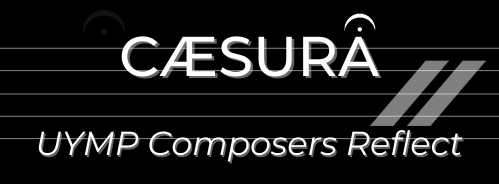In 2019 – before the global pandemic and lockdowns were even threatened - I sketched ideas for a new piece for Trilogy Ensemble (flute, viola and harp) based on notions of isolation. A key feature of the design was asynchronicity: any of the instruments could become independent of the others and play ‘alone’ in a way that didn’t necessarily synchronise with the ensemble. There would be passages in the piece where the ensemble plays together, but also moments where there was no pulse, where the performers rely on cues from other players to trigger their next move, as if they were acting out some sort of secret, musical ritual, or where two contrasting tempi are played simultaneously.
Before I fall asleep, the city, again...
When I sat down to start composing in March 2020 it wasn’t long before we were in the grip of a national lockdown, and the projected isolation suddenly became real! I must confess, I thought it would be easier! Composing, for me, is generally a solitary practice, and whilst I love collaborations of all kinds (and really value discussions with performers, writers, choreographers etc.) there comes a time when I need to work alone. I prefer longer expanses of time for composing: from experience, it’s not something I can squeeze into in an odd ten minutes between other tasks, although that’s sometimes where the best ideas originate, so the government-enforced lockdown initially appeared to be an unexpected bonus, offering an extended stretch of high-quality composing opportunity, but the reality was very different.
Firstly, the pressures of my university work increased massively: everything took longer working from home than on campus. Online meetings, students with significant concerns, colleagues with childcare responsibilities and an immediate need to redesign our teaching delivery and assessment all contributed to a very demanding workload. If anything, there was a dramatic reduction in the time available for composing, and my new routine left very little of that necessary ‘thinking space’ away from the studio where ideas are sometimes more fluid and unrestricted.
Secondly, all upcoming performances were cancelled and all composing deadlines put on ice. It turns out that those deadlines are crucially important in bringing a sense of order and certainty to my composing life, and that much of the motivation for composing comes from external sources. Without bookshops and art galleries, and with no visits to historical sites available and certainly no trips abroad I felt cut-off from my usual sources of ideas and creativity.
One unforeseen benefit of those strange times was that I was able to walk around the city where I live in almost complete isolation. I saw things I hadn’t noticed before, and saw familiar details from new perspectives. Devoid of people, the city assumed an abstract, almost imaginary quality, and I was reminded of those cities in the fiction of Calvino or Robbe-Grillet which exist only in the minds of their authors and readers, and this became very significant in the realisation of my new piece.
As I zig-zagged the deserted streets I encountered sights previously seen from different directions, angles and perspectives. Familiar sights mixed with unfamiliar, and familiar ones appeared in new guises. In this, memory plays an important role, so in the music I have tried to ensure that there are elements which will be clearly recognised as they reappear, and remembered, even if they are never quite the same. Musical ideas move into the foreground then recede, only to return later in different contexts.
The title of the piece is the first line of a novel by Alain Robbe-Grillet, who also delighted in these multiple perspectives; it casts my piece into the domain of a recurring, if half-forgotten, memory.
The first performance of Before I fall asleep, the city, again… took place in an online broadcast from Helmsey Arts Centre in March 2021 given by Trilogy Ensemble. Future performances in York and London are planned.

